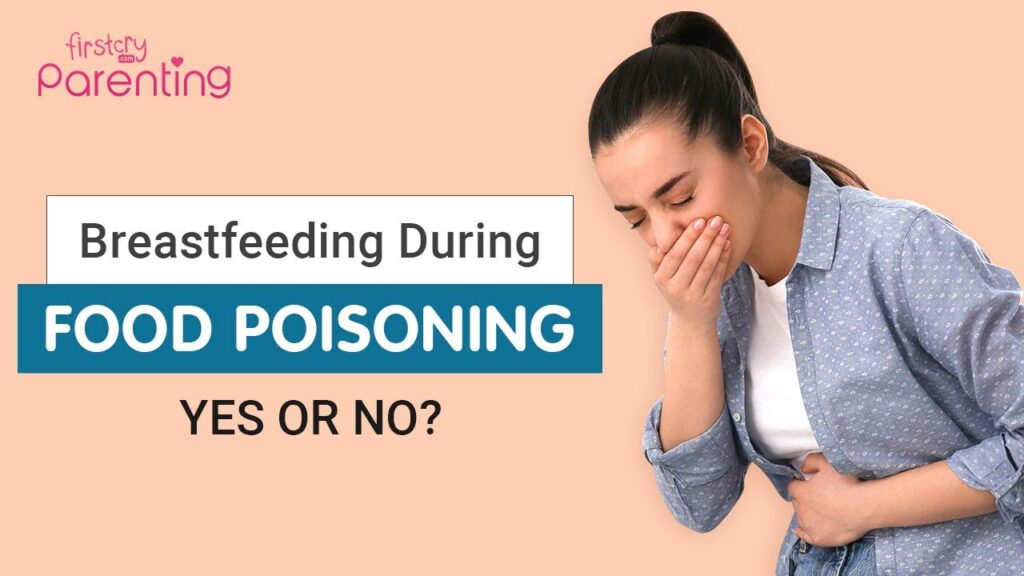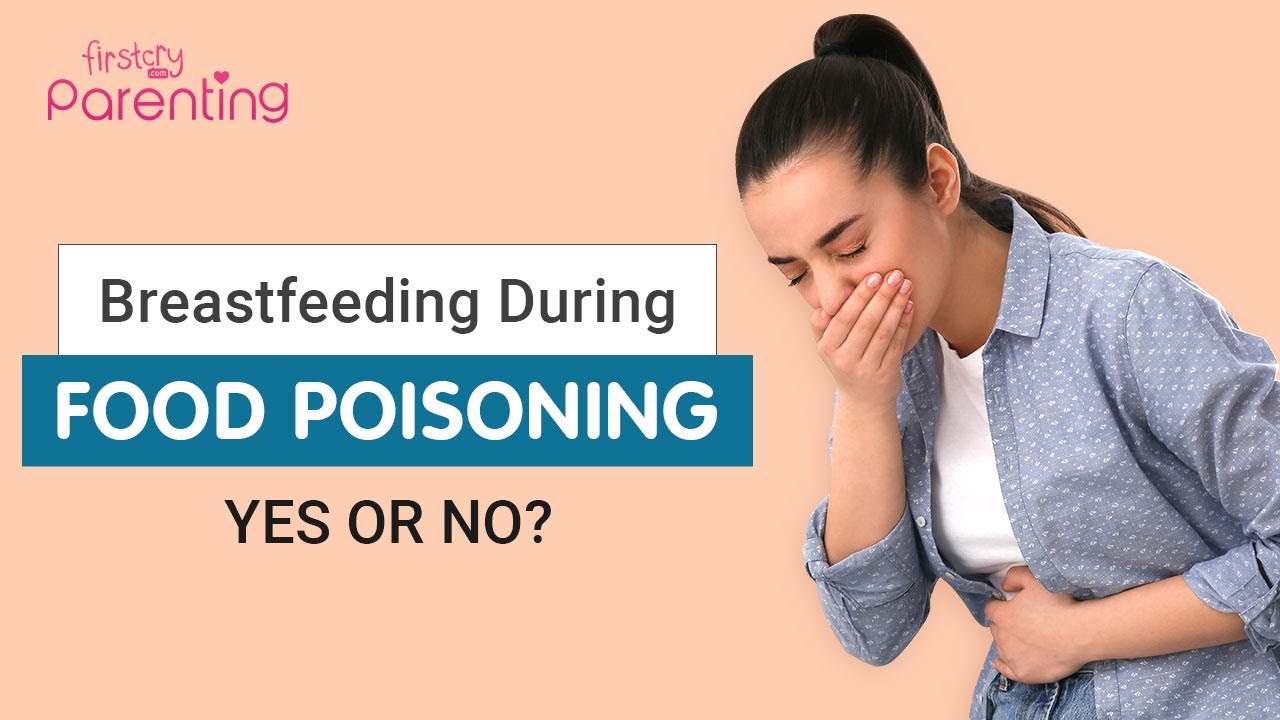
Breastfeeding When Food Poisoned: Protecting Your Baby’s Health
Experiencing food poisoning as a breastfeeding mother can be incredibly distressing. Your immediate concern is undoubtedly for your baby’s well-being. Can you continue breastfeeding? Will your baby get sick? This comprehensive guide addresses all your questions about breastfeeding when food poisoned, offering expert advice to help you make informed decisions and prioritize your baby’s health while navigating your own recovery. We’ll explore the science behind breastfeeding during illness, debunk common myths, and provide practical steps to protect your little one. Our goal is to give you the knowledge and confidence to continue providing the best possible nourishment for your baby, even when you’re feeling your worst.
Understanding Food Poisoning and Breastfeeding
Food poisoning, or foodborne illness, occurs when you consume contaminated food or drink. Bacteria, viruses, and parasites are the most common culprits. Symptoms can range from mild nausea and diarrhea to severe vomiting, abdominal cramps, and fever. But how does this affect your breast milk and your baby?
How Food Poisoning Affects Breast Milk
The good news is that most foodborne illnesses do not directly pass into breast milk. Your body acts as a natural filter, preventing the pathogens themselves from entering your milk supply. However, the toxins produced by some bacteria, like Staphylococcus aureus, can potentially pass into breast milk, though this is rare. More commonly, the dehydration and stress caused by food poisoning can indirectly impact milk production.
The Baby’s Perspective: Immunity and Breast Milk
Breast milk is rich in antibodies that can actually protect your baby from the very illness you’re experiencing. When you’re exposed to a pathogen, your body creates antibodies to fight it. These antibodies are then passed to your baby through your breast milk, providing passive immunity. This is one of the many remarkable benefits of breastfeeding, even when you’re not feeling well. Remember, maintaining hydration is paramount, both for your recovery and for milk production.
Key Considerations: Is Breastfeeding Safe?
In most cases, yes, breastfeeding is safe when you have food poisoning. The benefits of continuing to breastfeed generally outweigh the risks. However, there are specific situations where caution is advised:
- Severe Dehydration: If you’re severely dehydrated and unable to keep down fluids, your milk supply may temporarily decrease. Seek medical attention immediately to address the dehydration.
- Bloody Diarrhea or Vomit: This could indicate a more serious infection requiring specific treatment. Consult your doctor to determine the best course of action.
- High Fever: While fever itself doesn’t contaminate breast milk, it can make you feel extremely unwell and impact your ability to care for your baby. Consider expressing milk if you’re too weak to breastfeed directly.
- Medications: If you’re taking medication for food poisoning symptoms, check with your doctor or pharmacist to ensure it’s safe for breastfeeding.
It’s crucial to monitor your baby for any signs of illness, such as fever, vomiting, diarrhea, or unusual lethargy. If you notice any of these symptoms, contact your pediatrician immediately.
Steps to Take When Breastfeeding and Food Poisoned
Here’s a practical guide to managing breastfeeding while recovering from food poisoning:
- Stay Hydrated: This is the most important step. Drink plenty of water, clear broths, and electrolyte solutions to replace fluids lost through vomiting and diarrhea. Dehydration can significantly impact milk supply.
- Rest: Your body needs rest to recover. Enlist the help of your partner, family, or friends to care for your baby so you can focus on getting better.
- Continue Breastfeeding: Unless your doctor advises otherwise, continue breastfeeding as usual. Your milk provides vital antibodies to protect your baby.
- Practice Good Hygiene: Wash your hands thoroughly with soap and water before and after breastfeeding, changing diapers, and preparing food. This helps prevent the spread of any potential infection.
- Monitor Your Baby: Keep a close eye on your baby for any signs of illness. If you’re concerned, contact your pediatrician.
- Consider Expressing Milk: If you’re too weak to breastfeed directly, express your milk using a breast pump or by hand. This will help maintain your milk supply and provide your baby with breast milk.
- Consult Your Doctor: Don’t hesitate to contact your doctor if your symptoms are severe or if you have any concerns about your health or your baby’s health.
The Role of Electrolyte Solutions in Recovery
Electrolyte solutions like Pedialyte or Gatorade can be beneficial for rehydration, as they help replenish essential minerals lost through vomiting and diarrhea. These solutions contain sodium, potassium, and chloride, which are crucial for maintaining fluid balance and nerve function. Choose sugar-free or low-sugar options to avoid further stomach upset. Remember, electrolyte solutions are a supplement to, not a replacement for, plain water.
Medication Considerations for Breastfeeding Mothers
When you’re sick, you might be tempted to reach for over-the-counter medications to relieve your symptoms. However, it’s essential to be cautious about what you take while breastfeeding. Many medications are safe, but some can pass into breast milk and potentially harm your baby. Always consult your doctor or pharmacist before taking any medication, including over-the-counter remedies, while breastfeeding. Some common medications and their considerations include:
- Acetaminophen (Tylenol): Generally considered safe for breastfeeding mothers.
- Ibuprofen (Advil, Motrin): Also generally considered safe in recommended doses.
- Loperamide (Imodium): Use with caution, as small amounts may pass into breast milk. Consult your doctor.
- Bismuth Subsalicylate (Pepto-Bismol): Not recommended for breastfeeding mothers due to the risk of salicylate exposure to the baby.
Boosting Your Immune System Naturally
While you’re recovering from food poisoning, focus on supporting your immune system naturally. This includes:
- Vitamin C: Consume foods rich in Vitamin C, such as citrus fruits, berries, and leafy greens.
- Zinc: Zinc is essential for immune function. Good sources include lean meats, poultry, and nuts.
- Probiotics: Probiotics can help restore the balance of gut bacteria, which is often disrupted by food poisoning. Consider taking a probiotic supplement or eating probiotic-rich foods like yogurt.
- Ginger: Ginger has anti-inflammatory and anti-nausea properties. Sip on ginger tea to soothe your stomach.
- Garlic: Garlic has antimicrobial properties that can help fight infection. Add it to your meals or take a garlic supplement.
Preventing Food Poisoning: Protecting Yourself and Your Baby
Prevention is always better than cure. Here are some tips to prevent food poisoning and protect yourself and your baby:
- Wash Your Hands: Wash your hands thoroughly with soap and water before preparing food, eating, and after using the restroom.
- Cook Food Thoroughly: Use a food thermometer to ensure that meat, poultry, and seafood are cooked to the proper internal temperature.
- Store Food Properly: Refrigerate perishable foods promptly and store them at the correct temperature.
- Avoid Cross-Contamination: Use separate cutting boards and utensils for raw and cooked foods.
- Be Careful with Leftovers: Refrigerate leftovers within two hours and consume them within three to four days.
- Avoid Risky Foods: Pregnant and breastfeeding women should avoid certain foods that are more likely to cause food poisoning, such as raw or undercooked meat, poultry, seafood, and eggs, as well as unpasteurized dairy products.
Expert Insights on Breast Milk Sharing and Safety
In some situations, mothers may consider breast milk sharing as an option, especially if their own milk supply is temporarily affected by illness. However, it’s crucial to approach breast milk sharing with caution and prioritize safety. Screen the donor carefully to ensure they are healthy and free from infectious diseases. Ideally, obtain breast milk from a reputable milk bank that screens donors and pasteurizes milk to eliminate potential pathogens. Informal breast milk sharing carries risks, so weigh the benefits and risks carefully before making a decision. Always consult your doctor or lactation consultant for guidance.
Understanding the Impact of Stress on Milk Supply
Experiencing food poisoning can be incredibly stressful, and stress can sometimes impact milk supply. When you’re stressed, your body releases cortisol, which can interfere with the hormones responsible for milk production. To manage stress, try relaxation techniques such as deep breathing, meditation, or yoga. Get as much rest as possible and lean on your support network for help. Remember, stress is temporary, and with proper self-care, your milk supply will likely return to normal once you’re feeling better.
Lactation Consultant Insights: Seeking Professional Support
If you have any concerns about breastfeeding while recovering from food poisoning, don’t hesitate to seek professional support from a lactation consultant. Lactation consultants are experts in breastfeeding and can provide personalized advice and support. They can assess your breastfeeding technique, address any latch issues, and help you maintain your milk supply. They can also provide guidance on medication safety and other breastfeeding-related concerns. A lactation consultant can be a valuable resource during this challenging time.
Navigating Recovery and Maintaining Your Milk Supply
Recovering from food poisoning while breastfeeding requires a multifaceted approach focused on hydration, rest, and continued breastfeeding. By prioritizing these key elements, you can safeguard both your health and your baby’s well-being. Remember to listen to your body, seek medical advice when needed, and don’t hesitate to ask for help from your support network. Your commitment to breastfeeding is a testament to your dedication as a mother, and with the right care, you can overcome this challenge and continue providing the best possible nourishment for your little one. Consider joining online breastfeeding support groups to connect with other mothers who may have similar experiences.

